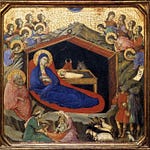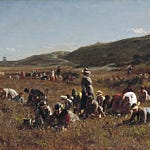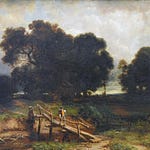The Knight of the Red Cross, young and a bit headstrong and therefore an easy mark, has been tricked by a wicked magician into leaving his beloved Una, and has now taken up, as a damsel in distress, Duessa. She’s a witch — and that’s not just to describe her character. But she’s got herself up as a beautiful woman, and the young Knight begins to court her. They take their rest in a clearing of the woods, but when Red Cross breaks off a branch of a tree to weave a garland for Duessa, blood starts to drip out, and the tree begins to speak. Think of it as an item to check off on your list of Things Every Epic Poem Should Have: a bleeding tree, with some soul inside. Homer’s got one, Virgil’s got one, and Dante and Ariosto and Tasso have them, so our poet this week, Edmund Spenser, has one too. Fradubio is his name — Brother Doubt. He was passing by with the woman he loved, when all at once the same Duessa showed up, and Fradubio wondered which woman was lovelier, his true love or Duessa. He was in doubt, our Word of the Week, and that’s all that Duessa needed to tip the scales her way.
Eventually, Fradubio saw what Duessa was really like, because once a year every witch has to appear in her true colors, and he saw her, a foul, ancient, grizzled, misshapen half-human beast, bathing herself in oregano and thyme. No, I am not making this up. Boys, if your girl friend orders fifty pounds of oregano and thyme, beware! And that’s why she has turned him into a tree. Of course, the lesson Spenser gives us is that true love would never have set the beloved in the scales in the first place. That was the betrayal right there. He doubted before he doubted.
Our word doubt, coming into English from the French, is related to Latin dubia, balance scales. Think of how you set things of nearly equal weight in the scales, and they tremble back and forth, a little up, a little down. That is what the Latin verb dubitare literally means: a trembling, a teetering, that could go either way. The -t- inside that verb is what we call a frequentative: it suggests an action that repeats itself or that goes back and forth. In English, endings like -le and -er serve the same purpose: think of flutter, wiggle, shuffle, skitter, ripple, shimmer, and many, many more. When the French brought the word to England, they had already lost the b inside the word, so that Chaucer spelled it as doute and pronounced it as doo-teh. But scholars in the English Renaissance stuck the b back in, because it was true to the historical Latin source. They did the same darned thing with debt, which Chaucer spelled and pronounced as dette. The result is that schoolchildren for the last 400 years have had to be in doubt whether to spell doubt as doubt or dout; and for their doubt they are in debt to the old meddlers.
We shouldn’t worry too much about doubt. It is a part of the way we are. We don’t see into the essence of things at one glance. Whenever something new or unsuspected comes upon us, even if it is the worst or the silliest thing in the world, we will experience a moment of indecision: the doubt. We hear some argument against something to which we’ve given our hearts, and we’ve never heard it before, and the balance-scales seem to tremble. We don’t seek it, but we shouldn’t put any stock in it when it comes our way, either. And certainly the feeling of doubt is no more important than is the slight wavering of a reed in the breeze. Thomas doubted, and look where he is now.
Word & Song is an online magazine devoted to reclaiming the good, the beautiful, and the true. We publish six essays each week, on words, classic hymn, poems, films, and popular songs, as well a weekly podcast, alternately Poetry Aloud or Anthony Esolen Speaks. To support this project, please join us as a free or paid subscriber.













